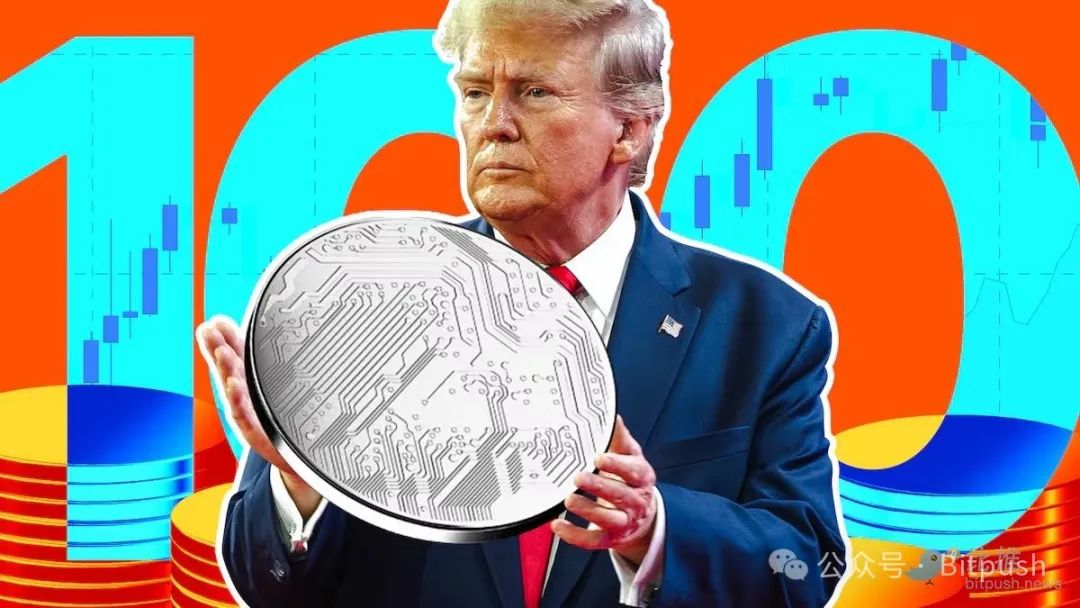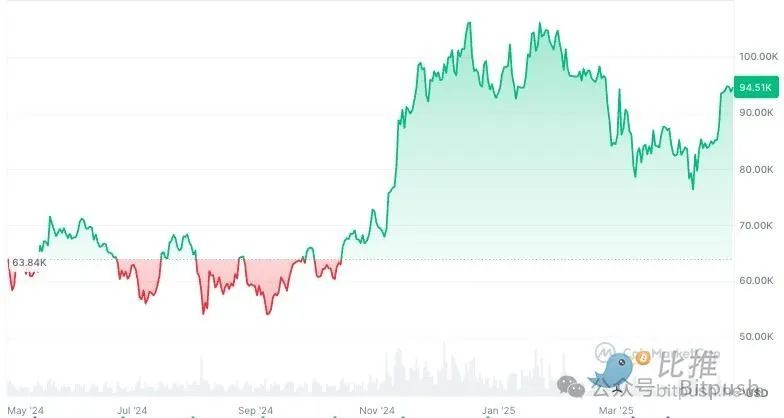Trump’s 100-day cryptocurrency policy “report card”: Why is it difficult to stop Bitcoin’s “roller coaster”?

転載元: panewslab
04/30/2025·25D
Since #Trump took office as US President, it has been a mess for all industries. As he celebrates his second 100-day term, supporters of digital assets have also begun to examine what Trump's rule has brought to the industry.
Mateusz Kara, CEO of cryptocurrency Ari10, told DL News that the question is, “Do we overestimate what Trump can do?”
In last year's U.S. election, the cryptocurrency industry supported Trump, hoping that he could end the Biden administration's cryptocurrency suppression, implement rules that benefit the industry, and start a bull market.
While some rules have been relaxed, the White House trade war has caused global cryptocurrency market value to shrink by nearly 21%, or about $800 billion, since its December high.
#Bitcoin fell more than 10% from its level the day before Trump's inauguration on January 20, when the price of Bitcoin hit an all-time high of $109,225.
Dow Jones market data showed that earlier this month, bitcoin, along with other risky assets, fell below $74,500 on April 7, and rebounded to around $94,500 as of the time of writing.

So, what promises Trump has fulfilled so far and where will the industry go?
The "cryptocurrency war" in the Biden era
Former U.S. President Joe Biden has harshly criticized cryptocurrencies, pushing for strict regulation of the industry and supporting the crypto-strike campaign launched by then-SEC Chairman Gary Gensler.
During the campaign, Trump promised to end Biden's "cryptocurrency war."
After taking office, Trump replaced Gemsler with new pro-cryptocurrency chairman Paul Atkins, who promised to bring clarity to cryptocurrency regulation.
This year, the SEC dropped lawsuits against cryptocurrency companies such as Coinbase, Ripple and Kraken.
Trump has also appointed industry supporters, such as Howard Lutnick, a financial tycoon who supports Tether, as Commerce Secretary, and David Sacks as cryptocurrency tsar.
During his first 100 days in power, Trump issued a series of comprehensive orders prohibiting the creation of digital dollars, protecting self-custody, setting up regulatory cryptocurrency advisory groups, and building strategic Bitcoin reserves.
He also pardoned the founder of Silk Road Ross Ublich and hosted the first White House cryptocurrency summit.
This year, federal regulators have revoked several Biden-era cryptocurrency guidelines, paving the way for financial institutions to enter cryptocurrency services.
Symbolism > Substantive benefits?
In short, Trump appears to have fulfilled most of his cryptocurrency promises. So, why are some market observers dissatisfied?
“So far, many campaign commitments seem more symbolic than substantial,” Jonathan Dixon, executive at regulator-tech company eflow Global, told DL News.
“Bitcoin reserves are essentially a rebranding—these assets have long been held by the government and are not signs of active participation in the market.”
Dixon said that while Trump's move marks a "rhetorical shift with the previous administration", "rhetoric alone cannot translate into regulatory certainty."
The Trump administration has not pushed for the passage of new laws, but some are moving forward on Capitol Hill.
"We're going well," Sen. Tim Scott, a Republican of South Carolina, said in early April.
Eric Rose, executive director of digital assets at StoneX Digital, pointed out: "These are very good factors for the field, but they need time to prove... Just because allowing banks to participate in the digital assets field does not mean they will be able to enter tomorrow, right? They need time to develop strategies, decide where they want to develop, how to implement the strategy, and recruit relevant personnel for it."
Eric Rose said in his acceptance of the Market Watch that this could take up to two years of preparation.
The chaos caused by the trade war
"The market may be disappointed with Trump's administration because we have not seen the market rise. This is the result of delayed rate cuts and the chaos Trump has brought to the market."
Trump has so far failed to deliver on his promise of a rate cut, and the Fed's rate cut is seen as a catalyst for risky assets such as cryptocurrencies and stocks.
That's one reason why Bitcoin soared when the central bank cut interest rates in September and November.
The problem is that the Fed operates independently from the White House and Fed Chairman Jerome Powell is reluctant to cut interest rates, especially after Trump imposed full tariffs on nearly 100 countries, including island countries where most of his residents are "penguins" and made the financial future of the United States more uncertain.
The overall cryptocurrency market rebounded slightly after Trump stopped these tariffs, but any hostilities could offset the impact.
"The U.S. government's trade war will inevitably affect the cryptocurrency industry, and the focus is on whether cryptocurrencies can continue to act as a hedge for global market behavior," said Anthony Young, chief commercial officer of cryptocurrency risk management company CoinCover.
Some believe that Trump's trade war may be good for cryptocurrencies.
"Trump's foreign trade policy may actually make cryptocurrencies more attractive to those who want to avoid traditional financial systems or government control of currencies," said Papuna Lezhava, CEO and co-founder of fintech startup Keepz and former consultant at the International Monetary Fund.
This article is compiled from DL News, MarketWatch, etc., and its views are for reference only



 jinse
jinse